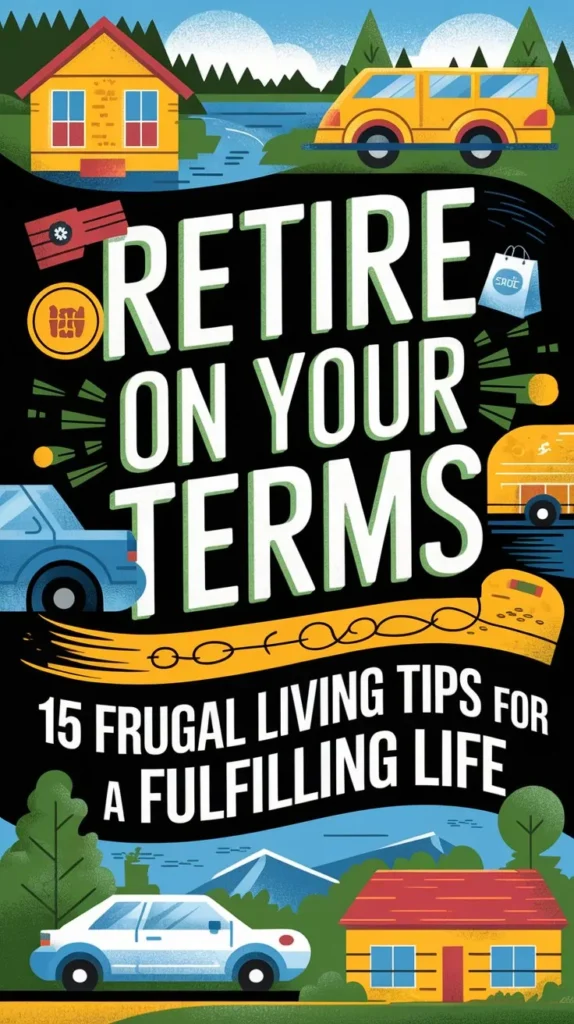As you approach or enter retirement, you’ll likely be thinking about how to make the most of your savings while still enjoying the lifestyle you’ve worked hard for. You’re not alone in this concern, and it’s vital to adopt a frugal mindset to secure your financial future.
By taking control of your finances and making a few key adjustments, you can live comfortably without breaking the bank. But where do you start? By understanding your financial situation, you can begin to make informed decisions that will set you up for long-term success – and that’s exactly where we’re about to start.
In A Nutshell
- Calculating net worth by adding assets and subtracting liabilities is essential for financial planning in retirement.
- Downsizing can reduce expenses on utilities, maintenance, and property taxes without sacrificing quality of life.
- Investing in experiences, such as travel or learning a new skill, provides a sense of fulfillment in retirement years.
- Using public transportation reduces transportation costs, fuel consumption, and vehicle maintenance, contributing to a sustainable lifestyle.
- Tracking expenses effectively using a budgeting app or spreadsheet helps identify areas to cut back and allocate resources more efficiently.
Assess Your Financial Situation

As you approach retirement, vitally, you must take a close look at your financial situation.
This involves calculating your net worth by adding up your assets and subtracting your liabilities. Be honest with yourself about your spending habits and financial decisions. You’ll be able to identify areas where you can cut back and allocate resources more efficiently.
Assessing your financial situation helps you set realistic financial goals for retirement.
You’ll want to ponder what you want your retirement to look like and how much money you’ll need to achieve that. Start by estimating your living expenses in retirement, including essential costs like housing, food, and healthcare. Don’t forget to factor in discretionary spending, such as travel and hobbies.
Create a Budget Plan
With your financial situation assessed and goals set, it’s time to build a roadmap to achieving them – a budget plan that will help you allocate your resources effectively in retirement.
This plan will serve as a guide for making financial decisions and guaranteeing you stay on track.
Start by identifying your income sources, including pensions, Social Security, and any part-time work.
Next, categorize your expenses into needs, wants, and debt repayment. Expense categorization will help you understand where your money is going and make adjustments as needed.
To track your expenses effectively, consider using a budgeting app or spreadsheet.
This will allow you to monitor your spending and stay within your means.
Budget tracking is vital in retirement, as it will help you avoid overspending and guarantee you have enough money to last throughout the year.
By regularly reviewing your budget, you’ll be able to make adjustments and stay on track to achieving your financial goals.
A well-crafted budget plan will provide you with peace of mind and help you enjoy a secure and fulfilling retirement.
Cut Unnecessary Expenses
Effective expense management is key to a successful retirement.
It’s time to assess your spending habits and cut unnecessary expenses that drain your retirement savings. To achieve this, adopt a frugal mindset and start by tracking every single expense, no matter how small.
Use a budgeting app or spreadsheet to log your daily expenditures, categorize them, and analyze your spending patterns.
By doing so, you’ll identify areas where you can cut back, such as subscription services, dining out, or entertainment.
Consider canceling unused gym memberships, streaming services, or magazine subscriptions. You can also save money by cooking at home, using coupons, or buying in bulk.
Expense tracking will help you stay accountable and make conscious spending decisions.
As you cut unnecessary expenses, allocate the saved funds towards essential expenses, debt repayment, or retirement savings.
Remember, every dollar counts, and making small adjustments to your spending habits can have a significant impact on your retirement savings over time.
Downsize Your Home
Your frugal mindset is already helping you save by cutting unnecessary expenses, and now it’s time to ponder a more substantial adjustment: downsizing your home.
Downsizing can notably reduce your expenses, especially on utilities, maintenance, and property taxes. Consider what you need versus what you have – if you’ve got more space than you use, it might be time to think about scaling back.
Start with home decluttering to assess your space and needs.
Go through each room and separate items into keep, donate, and discard piles. Be honest about when you last used each item, and whether you’re likely to need it again. As you declutter, you’ll be better able to identify which spaces in your home are essential to you and which you could do without.
Downsizing often means moving to a smaller space, but that doesn’t mean you’ll be sacrificing quality of life.
In fact, it’s all about space optimization – using each square foot effectively and efficiently.
Look for multi-functional furniture, smart storage solutions, and other creative ways to maximize the space you have.
With careful planning and execution, you can enjoy the financial benefits of downsizing without feeling cramped or uncomfortable.
Grow Your Own Food
Growing your own food can be a game-changer for retirees looking to save money and live more sustainably.
You can start by turning a portion of your yard into a food forest – a self-sufficient ecosystem that produces a variety of fruits, vegetables, and herbs.
This approach allows you to harvest fresh produce without having to maintain separate plots for each crop.
Another option is to join a community garden, where you can share knowledge, resources, and camaraderie with fellow gardeners.
Many community gardens also offer access to shared tools, composting facilities, and workshops, making it easier for beginners to get started.
When selecting what to grow, focus on nutrient-dense foods that can be used in a variety of dishes.
Leafy greens, tomatoes, and herbs like basil and rosemary are all excellent choices.
Consider also investing in a small greenhouse or indoor growing system to extend your growing season.
Cook at Home
Cooking at home can be a simple yet powerful way to take control of your diet and finances in retirement.
By preparing your own meals, you can avoid relying on expensive restaurants or processed foods, saving you a significant amount of money. Meal prep is a great way to start, allowing you to plan and cook your meals in advance.
This not only saves time but also helps reduce food waste.
To make cooking at home more efficient, try implementing some kitchen hacks.
Invest in a slow cooker or instant pot to make cooking easier and faster. Plan your meals around what’s in season to get the best deals on fresh produce.
You can also repurpose leftovers to create new meals, reducing waste and saving you money.
Additionally, consider batch cooking to freeze meals for later use.
By cooking at home and using these kitchen hacks, you can enjoy healthy, delicious meals while staying within your retirement budget.
This simple yet effective strategy can help you live more frugally and make the most of your retirement.
Use Public Transportation
Embracing a frugal lifestyle in retirement often involves making small changes to daily habits.
One effective way to reduce expenses is by using public transportation. By switching from driving a personal vehicle to using public transit, you can substantially lower your transportation costs. Public transit benefits include reduced fuel consumption, lower vehicle maintenance, and decreased parking expenses.
In addition to cost savings, using public transportation can also provide a sense of community and social connection.
You’ll have the opportunity to interact with others who share similar interests and experiences. Many cities offer affordable public transit options, such as buses and trains, making it easier to get around without relying on a personal vehicle.
Exploring transportation alternatives can also help you find the best option for your needs.
Consider carpooling, biking, or walking for shorter trips. By making a few simple changes to your daily routine, you can enjoy the benefits of public transportation and contribute to a more sustainable lifestyle.
Invest in Experiences
As you navigate your retirement years, you’re likely to find that investing in experiences brings more joy and fulfillment than accumulating material possessions.
This mindset shift can help you create lasting memories and a sense of connection with others.
One way to invest in experiences is through travel. Consider using travel rewards credit cards or loyalty programs to earn points or miles that can be redeemed for flights, hotels, or other travel expenses.
This can help you explore new destinations without breaking the bank.
Cultural immersion is another way to invest in experiences.
Take a cooking class, attend a local festival, or participate in a community art project.
These activities can help you connect with others who share similar interests and passions.
You can also consider volunteering or taking a class to learn a new skill.
Investing in experiences can help you build relationships, learn new things, and create a sense of purpose in your retirement years.
Prioritize Free Activities
When exploring ways to stay active and engaged in retirement, many retirees overlook a treasure trove of free activities that can be just as enriching as paid ones.
You can prioritize free activities by taking advantage of local resources such as park walks, community events, and public lectures. These activities not only save you money but also provide opportunities to meet new people and build connections.
Museum visits are another great way to engage in free activities. Many museums offer free admission on certain days of the week or month, so it’s worth checking their websites or calling ahead to plan your visit.
You can also consider visiting local libraries, which often host author readings, book clubs, and other events that are free and open to the public.
Manage Healthcare Costs
You’re likely to face one of the biggest expenses in retirement: healthcare costs.
As you age, medical expenses can add up quickly, straining your retirement budget. To manage these costs, consider exploring options beyond traditional healthcare.
Medical tourism, for instance, allows you to travel abroad for medical procedures at a lower cost. Many countries offer high-quality care at a fraction of the price you’d pay in the US. Research reputable medical tourism companies to find the best options for your needs.
Another way to reduce healthcare costs is to take advantage of prescription assistance programs.
Many pharmaceutical companies offer discounts or free medications to eligible patients. You can also look into programs like Medicare Extra Help or the Patient Access Network Foundation, which provide financial assistance for prescription medications.
Additionally, consider using generic or alternative medications, which can be substantially cheaper than brand-name options.
Consider a Side Hustle
How can you supplement your retirement income and stay engaged in your post-work life? Considering a side hustle can be a great way to achieve both goals.
A side hustle can provide an additional source of income, helping you maintain your desired lifestyle, while also keeping you mentally and physically active.
You can explore various side hustles that align with your skills and interests.
If you have a way with words, consider freelance writing. You can offer your services to businesses and websites that need content, or write articles and blog posts on topics you’re passionate about.
Alternatively, if you have teaching or tutoring experience, you can offer online tutoring services. Many students and professionals are looking for online tutors to help them with specific subjects or skills.
Having a side hustle can also provide a sense of purpose and belonging, which is essential for a fulfilling retirement.
It can help you stay connected with others, build new relationships, and feel more engaged with your community.
Minimize Debt Burden
Reducing your debt burden can be a significant step in securing your retirement finances.
As you approach retirement, verifying a debt-free status is crucial to guarantee a more stable financial future.
Start by evaluating your debt situation, including credit cards, loans, and mortgages.
Create a list of your debts, including the balance, interest rate, and minimum payment for each.
Next, consider debt consolidation strategies to simplify your payments and potentially lower your interest rates.
You can consolidate debt into a single loan with a lower interest rate, making it easier to manage your payments.
Credit counseling services can also provide valuable guidance on managing debt and creating a personalized plan to become debt-free.
Take Advantage of Discounts
As you approach retirement, taking advantage of discounts can substantially boost your purchasing power and help stretch your retirement savings.
Many businesses offer senior discounts, which can be a great way to save money on everyday items.
To maximize the benefits, it is crucial to know where to look and what to ask for.
1. Senior discounts: Many retailers, restaurants, and service providers offer discounts to seniors.
Don’t be afraid to ask if a senior discount is available, as it can save you up to 10% or more on your purchase.
2. Membership perks: Consider joining membership programs, such as AARP or AAA, which offer exclusive discounts on travel, insurance, and other services.
3. Loyalty programs: Sign up for loyalty programs with your favorite retailers, which can provide discounts, rewards, and other perks.
Sell Unused Items
Buried deep in your garage or stuffed in storage spaces around your house may lie opportunities for quick cash, found through your many purchases, upgrades and gifting or accumulated habits.
It’s time to turn these unused items into money. Start by decluttering and sorting items you no longer need or use. Be honest with yourself – if you haven’t used it in the past year, it’s probably safe to get rid of it.
Once you’ve gathered your items, consider selling them through online marketplaces like eBay, Craigslist, or Facebook Marketplace. These platforms make it easy to reach a wide audience and get a good price for your items.
Alternatively, you can host a garage sale to get rid of multiple items at once. Garage sales are a great way to attract local buyers and make some extra cash.
You can also use apps like Letgo or Decluttr to sell your items quickly and easily. By selling your unused items, you can free up space in your home and put some extra money in your pocket.
Plan a Retirement Account
You’ve freed up some extra cash by selling your unused items, now it’s time to think about where that money should go.
Planning a retirement account is crucial to achieve your long-term goals. Having a solid plan in place will give you peace of mind and help you make the most of your savings.
To plan a retirement account that works for you, ponder the following options:
- 401(k) or Employer-Sponsored Plan: If your employer offers a 401(k) or similar plan, contribute to it, especially if they match your contributions. This is virtually free money that can add up over time.
- Individual Retirement Account (IRA): If you don’t have access to an employer-sponsored plan, ponder opening an IRA. You can choose from traditional or Roth IRAs, each with its own tax benefits and rules.
- Annuities or Other Investment Options: Depending on your retirement goals and risk tolerance, you may also want to ponder annuities or other investment options, such as mutual funds or exchange-traded funds (ETFs).
When choosing a retirement account, ponder your investment options, fees, and retirement goals to make an informed decision that aligns with your financial needs.
Frequently Asked Questions
What’s a Good Age to Start Downsizing Belongings?
You’re likely facing the downsizing dilemma sooner than you think. Start adopting a minimalist mindset in your 40s or 50s to ease the shift, and begin decluttering non-essential items to make the process less overwhelming.
How Do I Choose a Side Hustle at 65?
At 65, you’re considering a side hustle – great. Explore elder entrepreneurship options that match your skills, like senior freelancing in writing, consulting, or tutoring. Research online platforms and local opportunities to find the best fit.
Are Online Courses Helpful for Senior Skills Development?
You can develop new senior skills with online courses, tackling tech anxiety by learning at your pace. They’re a flexible, accessible way to update your knowledge, gain confidence, and enhance senior learning, fitting around your lifestyle.
What Retirement Accounts Can I Still Contribute To?
You can still contribute to a Roth IRA or a Spousal IRA if you meet certain income requirements, allowing you to save for retirement while also considering your tax implications and overall financial strategy.
How Can I Deal With Guilt From Cutting Family Gifts?
You’re setting emotional boundaries by reevaluating gift expectations. It’s okay to adjust your giving habits, prioritize your needs, and communicate openly with loved ones to manage guilt and find a more sustainable balance.
FInal Verdict
By implementing these 15 retirement revolution tips, you’ll be well on your way to living frugally in 2024 and beyond. You’ll have assessed your financial situation, created a budget plan, and cut unnecessary expenses.
You’ll have downsized, grown your own food, and minimized debt. With a solid plan in place, you’ll enjoy a more stable financial future and a fulfilling post-work life, free to pursue your passions without financial stress.






Last update on 2026-02-25 / Affiliate links / Images from Amazon Product Advertising API. Some of the links on this website are affiliate links, which means that at no additional cost to you, I earn a commission if you click through and make a purchase. I only recommend products and services that I believe will add value to my readers. Thank you for your support!



